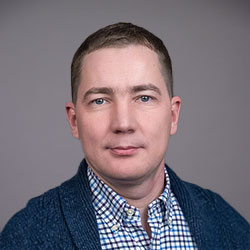2.6.1.Metal science and heat treatment of metals and alloys
The educational program
The program boasts several key features:
Fundamental Scientific Base:
In-depth study of the relationship between the structure, composition, and properties of metals and alloys, including the analysis of phase diagrams, phase transformations, and deformation mechanisms.
Applied Focus:
Practical application of knowledge to solve real-world industrial challenges.
Innovative Technologies:
Implementation of digital modeling and automation technologies for heat treatment processes.
Utilization of modern quality control systems and methods for predicting material properties.
Experimental and Laboratory Research:
Hands-on work with microscopes, heat treatment units, non-destructive testing systems, conducting mechanical tests, and analyzing microstructures.
Industry Connection:
Collaboration with industrial enterprises to solve actual production problems. Training of specialists in high demand by R&D institutes, metallurgy, and high-tech industries.
Core Disciplines:
- Metal Science and Heat Treatment of Metals and Alloys
- Specifics of Analyzing Physical-Mechanical Properties and Structure in Nano- and Micro-Volumes
- Modern and Promising Materials: Science and Technology
- Contemporary Methods for Analyzing Material Structure and Properties
Career Paths for Graduates:
Graduates of the postgraduate program in «Metal Science and Heat Treatment of Metals and Alloys» can pursue careers in research, production, and innovation. Key professions include:
- Research Engineer in Metal Science and Heat Treatment
- Research Scientist (at R&D institutes, academic institutions)
- Specialist in Computer Modeling of Materials
- Metallurgist/Materials Engineer (at metallurgical and machine-building plants)
- Lecturer-Researcher in Metal Science and Heat Treatment of Materials
Sample Thesis Topics:
- Structure Formation in Transition Zones of Multi-Materials Produced by Selective Laser Melting
- Analysis of the Structure and High-Temperature Stability of Niobium Carbide Precipitates in Heat-Resistant HP Alloys
- Production Technology, Structure, and Properties of Iron-Based Ferromagnetic Nanoparticles
- Kinetics of Structure Formation Processes during Crystallization Annealing of Amorphous Alloys
Research Projects:
Investigation of Structure Formation Processes in the Industrial Production of High-Strength Heat-Treatable Steels and Development of Mathematical Models for their Quantitative Description and Prediction of Final Mechanical Properties Considering Alloying Effects
[https://rscf.ru/project/19−19−281/](https://rscf.ru/project/19−19−281/)
Intelligent Digital Technologies for Manufacturing Products with Controlled Structure and Physical-Mechanical Properties Based on Additive Synthesis of New Materials and Structures
[https://rscf.ru/project/19−79−30 002/](https://rscf.ru/project/19−79−30 002/)
Development of Scientific and Technological Foundations for the Synthesis of Functionally Graded Titanium Alloys by Selective Laser Melting
[https://rscf.ru/project/18−13−111/](https://rscf.ru/project/18−13−111/)
Development of New Functional Materials, Smart Structures, and Technologies for Their Creation Using Additive Manufacturing Methods Based on Modern Modeling and Property Prediction Approaches
[https://rscf.ru/project/23−79−30 004/](https://rscf.ru/project/23−79−30 004/)
Development of Methods for Producing Metallic Dispersion-Strengthened, Intermetallic, and Composite Powder Materials with a Predetermined Particle Size and Shape Distribution for Additive Manufacturing of Products
[https://rscf.ru/project/15−13−62/](https://rscf.ru/project/15−13−62/)
Research Laboratories:
Laboratory for the «Study and Modeling of Structure and Properties of Metallic Materials»
[https://www.spbstu.ru/structure/laboratoriya-issledovanie-i-modelirovanie-struktury-i-svoystv-metallicheskikh-materialov/](https://www.spbstu.ru/structure/laboratoriya-issledovanie-i-modelirovanie-struktury-i-svoystv-metallicheskikh-materialov/)
Partners:
NRC «Kurchatov Institute» — CRISM «Prometey»
[https://www.crism-prometey.ru/](https://www.crism-prometey.ru/)
NRC «Kurchatov Institute» — CRISM «Prometey» is the country's largest interdisciplinary materials science center and a recognized leader in developing fundamentally new, strategically important advanced materials and technologies that address national scientific and industrial development goals and ensure state defense capabilities. The enterprise has held the status of a State Scientific Center of the Russian Federation since 1994. Prometey's developments are focused on key industries such as shipbuilding, nuclear, thermal, and hydropower, gas and oil production, machine building, and military equipment, where components, structures, and equipment operate under extreme conditions. The institute employs over 1,300 people, with a core team comprised of renowned scientists and specialists in metal science, metallurgy, welding, non-metallic composite materials, and nanotechnology.
